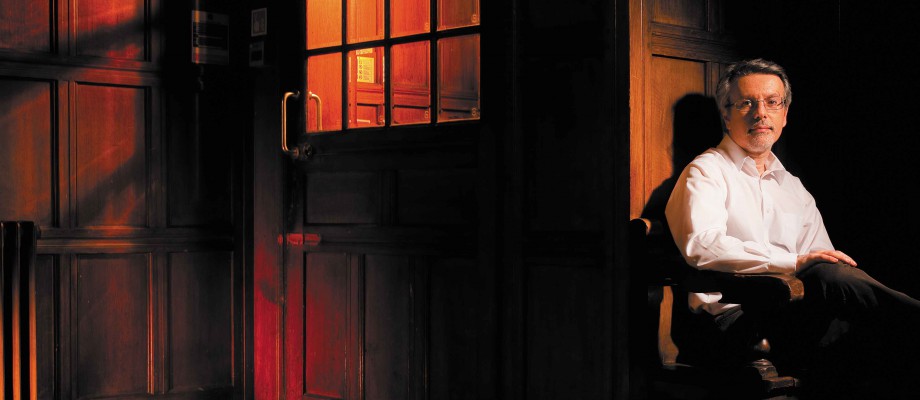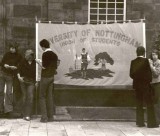
From Stars Wars to Late Spring
November 2nd, 2014
Dr Gianluca Sergi, Associate Professor of Film Studies, and Director of the University’s Institute for Screen Industries Research, tells
Rob Ounsworth about his life and work.
Tell me a bit about yourself?
I was born in Milan, Italy, in 1964 but when I was about 7 my family moved back to the south, to Reggio di Calabria. A passion for all things movies started very early on.
At the time there weren’t any film degrees. I did economics and after the first year I completely lost interest. The English connection came about from a group of students from The University of Nottingham on an exchange. One asked if I had ever thought about studying in the UK. She said ‘I have uncle who teaches film’. That uncle, [Alan Lovell, who later co-authored two books with Dr Sergi] became one of my best friends. I came, studied, and got an interest in staying in academia.
Do you have a typical day?
It has changed a lot since I started this project [the Institute for Screen Industries Research]. The film and television industry is global: there is always somebody who is up, somewhere, emailing. It could be something to do with one of the industry partners, or something to do with one of the visits of the industry fellows.
What drew you to this area of research?
I was lucky enough to be at an impressionable age when Dolby Stereo and movies like Star Wars that creatively used the technology came about. I went to see Star Wars with friends – everybody loved it. Afterwards, I simply said: “The film sound was fantastic”. They looked at me like I was from outer space! I didn’t know I would end up writing a PhD. I wrote to Ray Dolby saying I’m writing a PhD on sound and Dolby. Ray and Ioan Allen [a key figure at Dolby Laboratories and now an honorary graduate of the University] introduced me to the top professionals in their field.
What does it involve?
I was one of the few academics talking to film-makers about mutually beneficial research. The Institute establishes collaborations with studios, film-makers and film-making organisations; to do research together, create opportunities for research students. The Institute has interns in Hollywood. The film and television industry is global and this University has a presence in China, Malaysia and campuses here in Nottingham, so we are a possible research gateway to the world. Another area is new technologies and audiences’ response to it. Beyond that, I’ve researched models of development for studios. Academics get an overview. That creates opportunity for scholars and students, creates talent for industry and is beneficial for industry.
What do you like most/least about your work?
I don’t like it when I see cynicism. The good thing is to put it in reverse – colleagues, who had very little reason to believe in the project, have tried to make that leap of faith. And I’ve seen a very positive attitude from industry and film-makers. That is humbling but also very energising.
How does your work impact on the man/woman in the street?
Entertainment is a fundamental aspect of our life and experience. The film and television industry play a very important role within that. If my work helps this essential component of human life, I’m more than happy.
What are the highs/lows of your career so far?
It’s difficult to get the balance right between work, life and family. Sure, going to Hollywood sounds glamorous – and it can be – but it also takes me away from my children, Monica and Paolo. But I love working with students, their energy, enthusiasm, sense of fun. They’re inspiring.
What would you hope your research will achieve in your lifetime?
I would be very satisfied if we help better understanding of entertainment and the impact it has but also help the people who make the entertainment. If my work and the work of the Institute can help the UK film industry and television industry to grow that’s also a very good outcome.
What advice would you give to you your younger self?
Don’t waste any time being cynical.
What living person do you most admire and why?
Being a father [to Monica and Paolo] is bloody difficult and I know I’ll never be as good a father as I want to be. When I see truly dedicated fathers I admire them because I know it’s a difficult, difficult job.
Who would you invited to your dream dinner party?
Civil Rights leaders of the 60s. If I were to pick one it would be Malcolm X because there’s a story that tells you what you can do once you decide to become a better human being.
If you weren’t doing this what else would you be doing?
As a child, I wanted to be an astronaut. I liked science but gave it up too early. Or I would work with very young children – I love their energy. I also admire architects – it’s work that brings in so many disciplines, a bit like film-making. But I can’t draw!
Where do you call home?
I have always had trouble with nationalities, national boundaries. Home is of course where my children and my wife are, but home is also where my family are down there in Reggio Calabria.
If you could go back in time where would you go and why?
The 60s: A moment of convergence and a fantastic opportunity and excitement. Space exploration was the most obvious manifestation of that aspiration: to go beyond your boundaries, your limits. Transcending your origins, that’s my guiding principle.
How do you relax?
I listen to music, jazz in particular. I like spending time with my family. I like going to the movies, still! I like all genres, all kinds, all types. I’m a big fan of Hollywood movies but if I was to choose one movie paradoxically it would be a very small movie called Late Spring, made by a Japanese director called Ozu. It’s a film that moves me every single time.
Tags: Associate Professor of Film Studies, Dr Gianluca Sergi, Institute for Screen Industries Research, Late Spring, Star Wars
Leave a Reply
Other Issue 70

Faulty ‘switch’ linked to psychotic symptoms
Scientists have shown that psychotic symptoms experienced by people with schizophrenia could be caused by a […]


